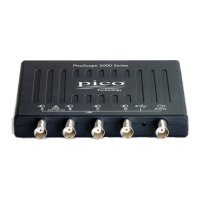handle: the handle of the required oscilloscope
timebase: a code between 0 and the maximum timebase (depending on
the oscilloscope). Timebase 0 is the fastest timebase. Each successive
timebase has twice the sampling interval of the previous one.
no_of_samples: the number of samples that you require. The function
uses this value to calculate the most suitable time unit to use.
time_interval: on exit, this location will contain the time interval, in
nanoseconds, between readings at the selected timebase. If
time_interval is NULL, the function will write nothing.
time_units: on exit, this location will contain an enumerated type
indicating the most suitable unit for expressing sample times. You should
pass this value to ps2000_get_times_and_values. If time_units is
null, the function will write nothing.
oversample: the amount of oversample required. For example, an
oversample of 4 results in a time_interval 4 times larger and a
max_samples 4 times smaller. At the same time it increases the effective
resolution by one bit. See Oversampling for more details.
max_samples: on exit, the maximum number of samples available. The
scope allocates a certain amount of memory for internal overheads and this
may vary depending on the number of channels enabled, the timebase
chosen and the oversample multiplier selected. If max_samples is NULL,
the function will write nothing.

